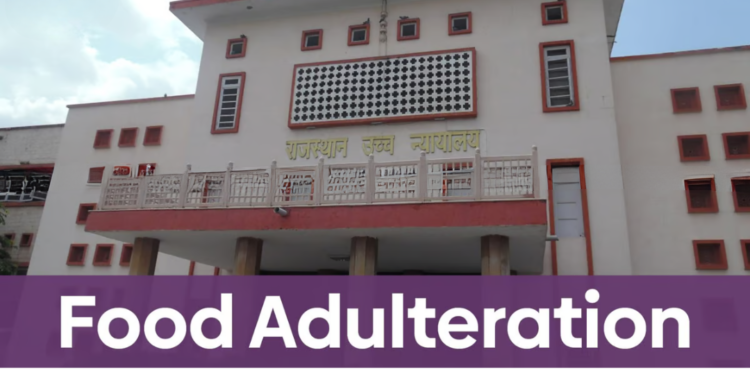The Rajasthan High Court on Monday took suo motu cognizance of increasing food adulteration and issued several directions to the State and Central governments.
Justice Anoop Kumar Dhand identified loopholes in the Food Safety and Standards Act, 2006, and highlighted the lack of food testing labs to scrutinize food manufacturing and processing industries. The Court observed that the food authority is understaffed and underfunded, unable to keep pace with the growing number of food industries.
“Due to lack of proper technology, at the ground level, the food authorities are not competent to monitor the situation. There are doubts about the standard procedures followed by the various laboratories in different States of the Country while scrutinizing the products,” the Court noted.
In this context, the Court initiated a public interest litigation suo motu to find solutions for the good health of all living beings.
“Food adulteration is an increasingly recognized global public health problem. Consuming adulterated food is highly toxic and leads to several health issues, including nutritional deficiencies, kidney disorders, and organ failures like the heart, kidney, and liver. Adulteration or contamination of natural food products is one of the major challenges in today’s society,” the Court underscored.
The Court emphasized that under Article 21 of the Constitution of India, people are protected against hazardous and injurious food articles, and under Article 47, it is the welfare State’s duty to ensure these rights are protected. However, it noted that the law does not provide solutions to all problems, as unorganized sectors are not covered.
“The Act of 2006 does not provide solutions to all problems, as various loopholes exist. The unorganized sectors, which include petty manufacturers, hawkers, and retailers, are ignored. It mainly emphasizes the processing industry. The primary sector is included in the Act of 2006, but the agricultural sector, producing primary food, is ignored,” the Court said.
The Court opined that the Central government was aware of the situation, which is why the Ministry of Health and Family Welfare framed the Food Safety and Standard (Amendment) Bill, 2020. However, it noted that the Bill has been lying in cold storage for reasons best known to the legislature.
“The laws are descriptive, and the implementation of the legislation is still at its beginning stage. The problem lies in its poor implementation. The Center and the State Governments must take the issue of food adulteration seriously to save lives from serious and life-threatening diseases caused by adulterated unsafe food,” the Court added.
Considering the seriousness of the situation, the Court issued the following interim directions to the State and Centre:
The Central and State Governments should take appropriate steps to implement the Act of 2006 more effectively.
The State Food Safety Authority (SFSA) should identify high-risk areas and times to ascertain where and when there are high chances of food adulteration and accordingly collect samples from those areas regularly.
The SFSA should ensure that testing labs have well-equipped infrastructure and technical personnel.
The SFSA and District Authorities should sample products regularly.
Snapshot summary tests should be conducted periodically at State, District, Urban, and Rural Levels.
A State Level Committee, headed by the Chief Secretary and the Additional & Principal Secretary of Health Welfare and Food Department, along with a District Level Committee, headed by the concerned District Collector, should be constituted to review the work done in curbing adulteration.
The Central and State governments and concerned departments should set up a website to create awareness about the complaint mechanism and the responsibilities of food safety authorities, including contact details of Food Safety Officers and a toll-free number.
The Central and State governments should put a check on compliance and unethical practices by Food Authorities and their Officers by evolving a complaint mechanism.
The government should take appropriate steps for the effective implementation of its scheme “Sudh ke Liye Yudh” in its letter and spirit.
The State Government/Food Authority/Commission of Food should circulate messages through SMS, FM Radio, Television, Newspapers, Print, Electronics, and Social Media to educate the public about the ill-effects of adulteration and educate children through workshops/seminars in schools to identify adulterated food components.
The Court further directed the authorities to submit compliance reports regarding the sampling being done to check food adulteration at the end of every month along with the steps being taken by them.
The matter will be heard next on July 30.
The Court also asked Senior Advocates at Jaipur and Jodhpur to assist the bench in the matter, mentioning the names of Senior Advocates NK Maloo, Madhav Mitra, Sanjay Jhanwar, Gayatari Rathore, MS Singhvi, Ravi Bhansali, Sachin Acharya, and Dr. Vikas Balia.
The Court also asked the Chairman/Vice Chairman of the Bar Council and the Presidents of the Bar Associations and Advocates’ Association at Jaipur and Jodhpur to assist the Court “for taking appropriate steps and issuing suitable directions for this pious public cause.”
“Video conference link be sent to the Advocates of Jodhpur whenever this matter is listed for hearing. Members of the Bar are also welcome to give their valuable suggestions by submitting written submissions,” the order said.

















